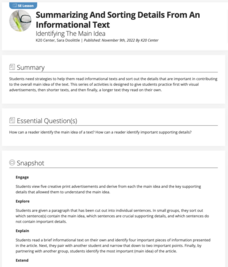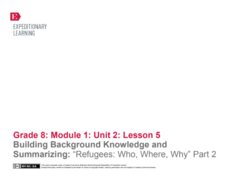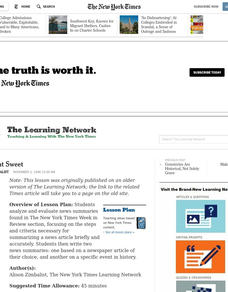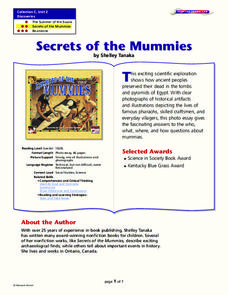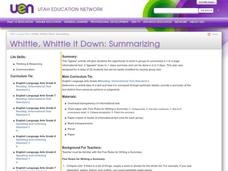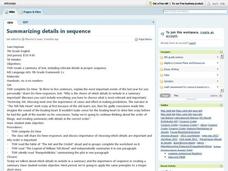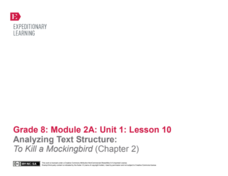Curated OER
Summarizing with Somebody Wanted But So
Teach your young readers how to summarize a text using a strategy called Somebody Wanted But So. Kids identify the character (Somebody), the motivation (Wanted), the conflict (But), and the resolution (So). The resource comes with...
Polk Bros Foundation
Comprehensive Nonfiction Reading Questions
Analyze any nonfiction text with the set of questions on this sheet. Class members practice inferring by noting the main idea and purpose of a passage. They also analyze an opinion in the passage and write a brief summary. See the...
K20 LEARN
Summarizing and Sorting Details from an Informational Text: Identifying the Main Idea
Scholars participate in two activities that teach them to identify the main idea and key supporting details in informational text. Partners create a visual that reflects the main idea and key supporting details in an informational text...
E Reading Worksheets
Summarization and Narrative Sequence
Readers are asked to identify seven important events in a narrative and then to explain why these events are key to the story. To conclude the activity, kids craft a summary using their list.
EngageNY
Building Background Knowledge and Summarizing: “Refugees: Who, Where, Why” Part 2
What are some universal aspects of refugees' experiences worldwide and throughout history? Scholars read the text "Refugees: Who, Where, Why" and create two class anchor charts. Finally, they each write a paragraph that provides an...
EngageNY
Summarizing Informational Text: “Hawaii’s Endangered Happy Face Spider”
Put on a happy face. Using an interesting resource, pupils read an informational text about Hawaii's endangered Happy Face Spider. Next, they participate in a jigsaw discussion to find the gist of the article.
Fluence Learning
Writing Informational Text: Lemonade Stand
Use a performance task to assess third graders' ability to read informational text. After they plan a lemonade stand business, young entrepreneurs implement that plan through informational writing. The task assumes learners can...
EngageNY
Mid-Unit Assessment: Analyzing an Author’s Argument and Text Structure
William Shakespeare: a writer, a poet, a fake? For their mid-unit assessments, scholars read an excerpt from the article "The Top Ten Reasons Shakespeare Did Not Write Shakespeare" by Keir Cutler. Next, they analyze the author's argument...
EngageNY
Explaining the Relationships between Events in a Historical Text: Contextualizing the History of Baseball (pages 8–9, 25)
In other words ... it's time to give a summary. Scholars work with a partner to paraphrase a timeline card referring to Promises to Keep. They then work to merge the two timelines to create one timeline. Pupils finish by writing a...
Curated OER
Short and Sweet Science
Readers learn how to summarize scientific text and evaluate the advantages, disadvantages, and challenges in writing summaries. They select science-related articles you've pulled and collected from the New York Times and, with a partner,...
Curated OER
Short But Sweet
After analyzing and evaluating news summaries found in the New York Times "Week in Review" section, middle schoolers study the steps for summarizing a news article briefly and accurately. They write two news summaries: one on a newspaper...
Curated OER
Secrets of the Mummies
How did the ancient people of Egypt preserve their dead so well that their bodies are still recognizable today? Learn the painstakingly complex process they used for preservation. Young scholars read and summarize a narrative detailing...
Polk Bros Foundation
I Can Analyze a Story or History Completely and Carefully
Start off analysis of a text with a worksheet that asks pupils to complete several tasks. Class members note down a couple of characters or people and their distinguishing traits, describe the most important event, summarize the text...
University of North Carolina
Summary: Using it Wisely
Sometimes summarizing keeps a writer from going deeper into their analysis—don't fall into that trap. Learn the difference between summarizing and analyzing using an insightful resource. Focusing on introductions, the lesson shares...
College Board
The Departure
Scholars learn about the Hero's Journey as they read Ray Bradbury's "The Drummer Boy of Shiloh." They analyze the story's structure and narrative techniques. Finally, they write summaries of the text's central idea and use their...
Curated OER
Let's Summarize!
Students, after brainstorming what summarization is, practice the strategy of summarization to help pick out the important parts of text each time they read. They read and summarize the article, "10 Cool Things About Dolphins," from the...
Curated OER
Whittle, Whittle it Down: Summarizing
Sixth graders are introduced to the jigsaw method of summarizing text. In groups, they create their own summary and work together as a class to create just one class summary. To end the lesson, they read the class summary and review the...
Curated OER
Summarizing: James and the Giant Peach
Text marking and a T-chart format to distinguish important information from trivia help elementary readers summarize effectively. Encouraging readers to construct a chapter summary from paragraph-level topic sentences is another sound...
Curated OER
Main Idea in Informational Text
Readers identify main ideas and supporting details using informational texts. In this literacy lesson plan, they make predictions and read the text to find the main ideas. They use a table diagram to define the main idea and supporting...
Curated OER
Summarizing Details in Sequence
Seventh graders write a few sentences explaining the most important events of their lives during the past year. As a class, they discuss why they chose the elements they did for their sentences. To end the lesson plan, they read a...
EngageNY
Analyzing Text Structure: To Kill a Mockingbird (Chapter 2)
Scholars use the Narrative Structure graphic organizer to analyze the structure of the smaller stories within To Kill a Mockingbird. They talk with a partner to discuss how the structure adds meaning.
Curated OER
Summarization Mapping
Students observe and demonstrate the strategy of summarizing the main idea. They discuss six rules of summarizing, and observe the teacher summarizing the first chapter of the novel "The Incredible Journey." Students then read chapter...
Curated OER
Only the Facts
Practice the strategy of summarizing to gain meaning and knowledge from an informational text. Young readers highlight supporting details and main ideas, and then they use this to summarize two articles: "The Great Quake" and "What...
Curated OER
What Was That All About?
Through direct instruction, the teacher demonstrates how to identify the main idea and supporting details of a text when creating a summary. As a class, read a paragraph, highlighting relevant information and crossing out extraneous...
Other popular searches
- Summarizing Text Worksheets
- Free Summarizing Text
- Summarizing Text 3rd Grade
- Summarizing Text 2nd Grade
- Summarizing Text Samples
- Summarizing Text 7th Grade
- Summarizing Text Activities
- Summarizing Text Sheets
- Summarizing Text Content
- Summarizing Text Key Points
- Summarizing and Text Structure
- Text Comprehension Summarizing




